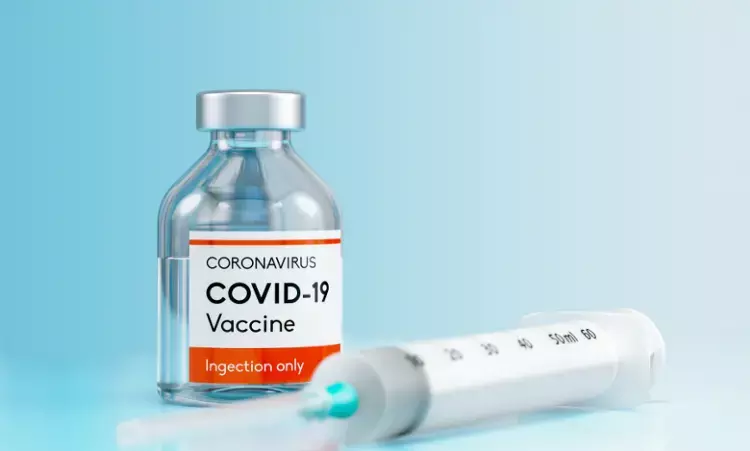- Home
- Medical news & Guidelines
- Anesthesiology
- Cardiology and CTVS
- Critical Care
- Dentistry
- Dermatology
- Diabetes and Endocrinology
- ENT
- Gastroenterology
- Medicine
- Nephrology
- Neurology
- Obstretics-Gynaecology
- Oncology
- Ophthalmology
- Orthopaedics
- Pediatrics-Neonatology
- Psychiatry
- Pulmonology
- Radiology
- Surgery
- Urology
- Laboratory Medicine
- Diet
- Nursing
- Paramedical
- Physiotherapy
- Health news
- Fact Check
- Bone Health Fact Check
- Brain Health Fact Check
- Cancer Related Fact Check
- Child Care Fact Check
- Dental and oral health fact check
- Diabetes and metabolic health fact check
- Diet and Nutrition Fact Check
- Eye and ENT Care Fact Check
- Fitness fact check
- Gut health fact check
- Heart health fact check
- Kidney health fact check
- Medical education fact check
- Men's health fact check
- Respiratory fact check
- Skin and hair care fact check
- Vaccine and Immunization fact check
- Women's health fact check
- AYUSH
- State News
- Andaman and Nicobar Islands
- Andhra Pradesh
- Arunachal Pradesh
- Assam
- Bihar
- Chandigarh
- Chattisgarh
- Dadra and Nagar Haveli
- Daman and Diu
- Delhi
- Goa
- Gujarat
- Haryana
- Himachal Pradesh
- Jammu & Kashmir
- Jharkhand
- Karnataka
- Kerala
- Ladakh
- Lakshadweep
- Madhya Pradesh
- Maharashtra
- Manipur
- Meghalaya
- Mizoram
- Nagaland
- Odisha
- Puducherry
- Punjab
- Rajasthan
- Sikkim
- Tamil Nadu
- Telangana
- Tripura
- Uttar Pradesh
- Uttrakhand
- West Bengal
- Medical Education
- Industry
Full Vaccination reduces risk of stroke, acute MI after COVID-19: JAMA

Korea: Full vaccination against SARS-CoV-2 is associated with a reduced risk of ischemic stroke and acute myocardial infarction (AMI) after COVID-19, says a recent study. The findings of the study, published in the Journal of the American Medical Association (JAMA), supports vaccination, especially for those with risk factors for cardiovascular diseases (CVDs).
Previous studies have shown an increased risk of acute MI and ischemic stroke following COVID-19 infection related to an increased thrombosis risk. Vaccines against SARS-CoV-2 prevents progression to severe disease and is effective against the disease. However, whether or not vaccines prevent secondary complications is not clear.
Against the above background, Young-Eun Kim, Big Data Department, National Health Insurance Service, Wonju, Korea, and colleagues aimed to compare the incidence of AMI and ischemic stroke after COVID-19 infection between patients who were never vaccinated and those who were fully vaccinated (2 doses of mRNA vaccines or viral vector vaccine) against SARS-CoV-2 in a retrospective cohort study.
For this purpose, the researchers examined data from the Korean nationwide COVID-19 registry and the Korean National Health Insurance Service database. The study focused on 231,037 adults diagnosed with COVID-19 between July 2020 and December 2021. 73% were considered fully vaccinated (two doses of an mRNA vaccine or a viral-vector vaccine) and the rest had not received any doses of COVID-19 vaccine.
A composite of hospitalizations for ischemic stroke and AMI that occurred 31 to 120 days after COVID-19 diagnosis was the primary outcome. Secondary outcomes included the components of the composite outcome.
Based on the study, the researchers reported the following:
- Of 592 719 patients with COVID-19 during the study period, 231 037 patients were included, of whom 62 727 were never vaccinated and 168 310 were fully vaccinated.
- Patients who were fully vaccinated were older and had more comorbidities. In contrast, severe or critical COVID-19 was less common in the fully vaccinated group.
- The differences in age and comorbidities were reduced after weighting, while the severity of COVID-19 became less balanced.
- The median follow-up duration starting 30 days after COVID-19 was 90 days in the unvaccinated group and 84 days in the fully vaccinated group.
- The composite outcome occurred in 31 unvaccinated patients and 74 fully vaccinated patients, with an incidence of 6.18 vs 5.49 per 1 000 000 person-days.
- The adjusted risk was significantly lower in the fully vaccinated group (adjusted hazard ratio [aHR], 0.42).
- The adjusted risk was significantly lower in fully vaccinated patients for both AMI (aHR, 0.48) and ischemic stroke (aHR, 0.40).
- A lower risk for outcome events in fully vaccinated patients was observed in all subgroups, although some did not reach statistical significance, including those with severe or critical infection.
The researchers conclude, "multiple factors that may also be associated with cardiovascular risk affect the decision to be vaccinated. A robust model was applied to alleviate the effect of such imbalances, but the possibility of unobserved bias remains."
Reference:
Kim Y, Huh K, Park Y, Peck KR, Jung J. Association Between Vaccination and Acute Myocardial Infarction and Ischemic Stroke After COVID-19 Infection. JAMA. Published online July 22, 2022. doi:10.1001/jama.2022.12992
Dr Kamal Kant Kohli-MBBS, DTCD- a chest specialist with more than 30 years of practice and a flair for writing clinical articles, Dr Kamal Kant Kohli joined Medical Dialogues as a Chief Editor of Medical News. Besides writing articles, as an editor, he proofreads and verifies all the medical content published on Medical Dialogues including those coming from journals, studies,medical conferences,guidelines etc. Email: drkohli@medicaldialogues.in. Contact no. 011-43720751


